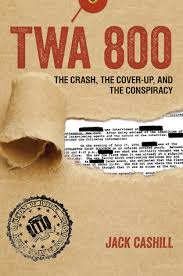The Hate Crime That Dares Not Speak Its Name
![]()

Order Jack Cashill's latest book, TWA 800: The Crash, the Cover-Up, and the Conspiracy
![]()

About Silenced: Flight 800
and the Subversion
of Justice (DVD) -
-Buy the Silenced DVD-
![]()
© Jack Cashill
August 30, 2017 - WND.com
For more than a year a person or persons was terrorizing the suburban neighborhoods of South Kansas City.
The five victims were all older men, ages 54 to 67. All were shot from behind. Several were walking their dogs. Four of the five were on or near a popular walking trail that runs along a creek.
The fourth of the five victims was a very popular owner of a local bar. His murder more or less forced the local media to cover the story, however reluctantly.
The fifth murder was the most brazen and the one that landed 22-year-old Fredrick Demond Scott in jail. Scott followed a 57-year-old man with physical limitations on to a city bus and off.
As the man walked towards his house, Scott crept up on him from behind and shot him in the back of the head. This happened at noon. Security cameras on the bus and from local businesses helped the police track Scott down.
DNA evidence left at the shooting scene enabled the police to link Scott to at least one other killing, and the evidence for the other three is extremely strong.
Prosecutors publicly charged Scott with the murders on Tuesday and shared a detailed criminal complaint.
On late Tuesday, the Kansas City Star deemed the arrest of a Royals pitcher on a DUI charge more newsworthy. On Wednesday morning top honors at the Star went to a dispute over a bid for a new airport terminal.
Nationally, the story has gone nowhere. 24 hours after the press conference not a single mainstream news outlet beyond Kansas or Missouri has picked up the story.
The reason why should be obvious to the savvy reader. Scott is black. His five victims were all white. Imagine were the races reversed.
Nowhere in the Star’s coverage of the killings does the word “hate” appear. There is not even any speculation on the part of the Star or the prosecutors that Scott targeted these men because they were white.
Imagine if a young white man had stalked and executed from behind five middle-class, middle-aged black men or Hispanic men or Muslims or gay men and told the police when arrested, “They didn’t see it coming.”
Within 6 hours the story would have been trending on Twitter. Within 12 hours every other Republican in Congress would be groveling before a microphone denouncing racism, homophobia, Islamophobia, white supremacism—you name it.
Within 24 hours, Democrats would be blaming President Trump for not denouncing this hate crime soon enough and demanding that he step down from office.
The weird thing, the sad thing, is that I am not exaggerating. The media’s unhinged response to Charlottesville was proof enough.
The American left, black social critic Shelby Steele wrote this week in the Wall Street Journal, has “a hunger for racism that is almost craven.”
Steele continues, “The writer Walker Percy once wrote of the ‘sweetness at the horrid core of bad news.’ It’s hard to witness the media’s oddly exhilarated reaction to, say, the death of Trayvon Martin without applying Percy’s insight.”
Adds Steele, “A black boy is dead. But not all is lost. It looks like racism.”
Steele explains in eloquent detail how the left uses racism as a weapon against the right, but he notes. “People are becoming openly cynical toward the left’s moral muscling with racism.”
Steele sees a possible solution. “As idealism was the left’s political edge, shouldn’t realism be the right’s. Reality as the informing vision—and no more wrestling with innocence.”
A week before Donald Trump declared for the presidency, I wrote on these pages, “The Republican nominee for president will be that candidate who best learns that there is no future in apologizing.”
Trump understood this instinctively. He ascended to the presidency for no larger reason than people respected his willingness to get real and to fight.
Those elected Republicans who tweeted out their most abject apologies after Charlottesville still don’t get it, still don’t understand they walked into the left’s most effective trap, still don’t realize their careers may be shortened if they don’t find their way out—quick!
Special Note:
Jack Cashill's Sentinel articles on the killings can be found here and here:

